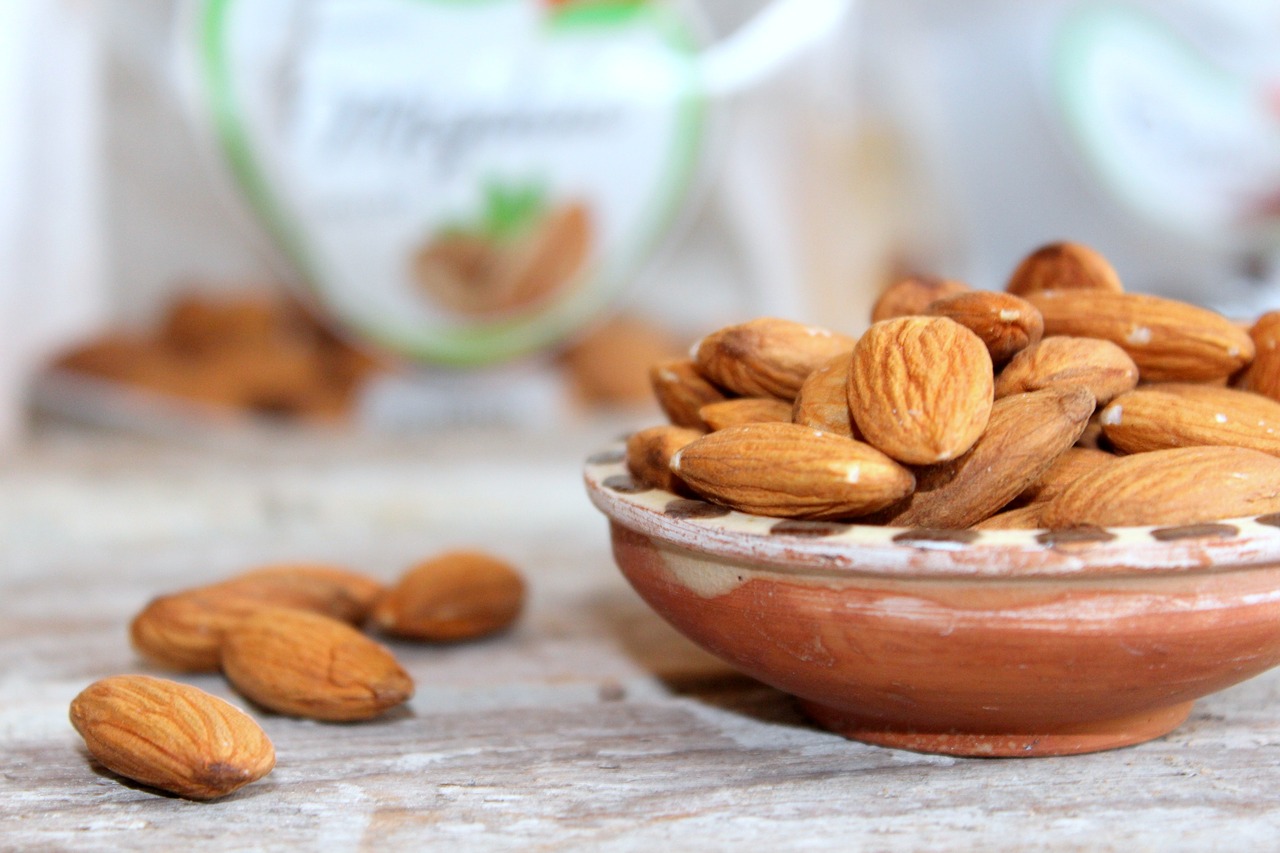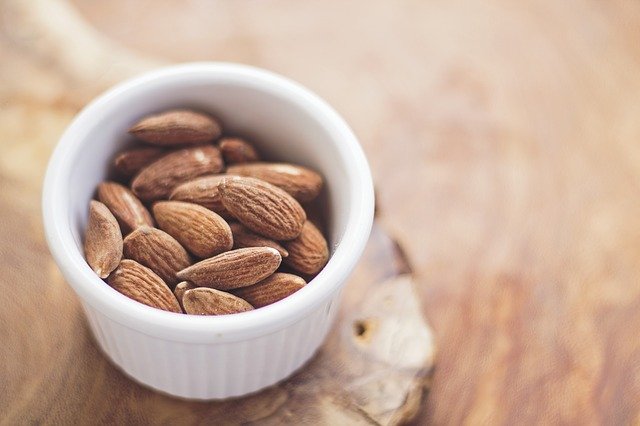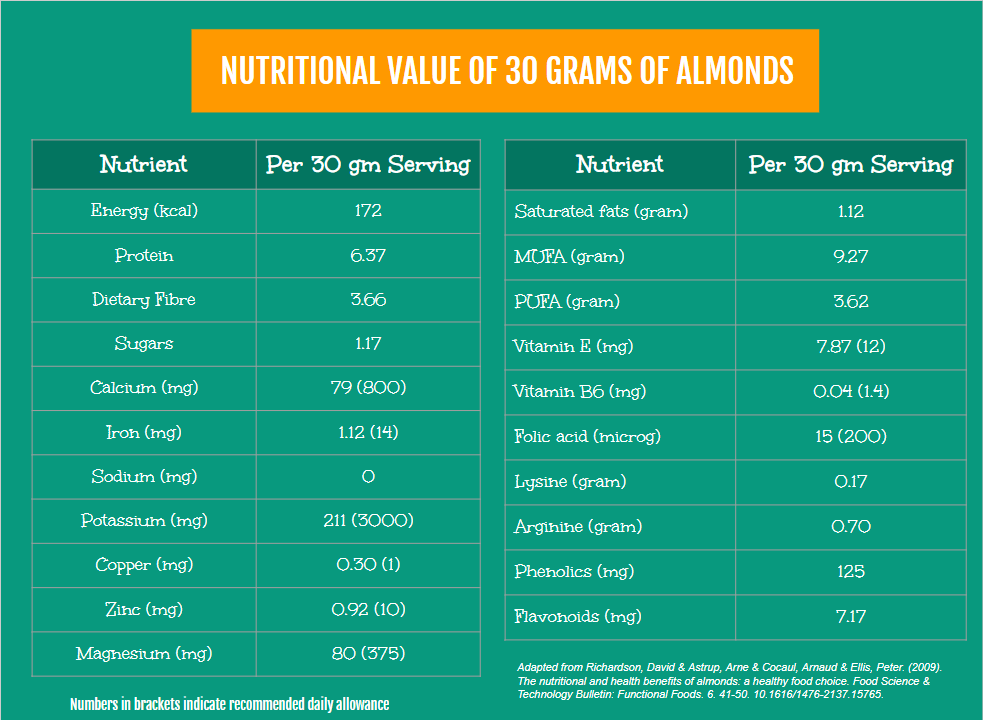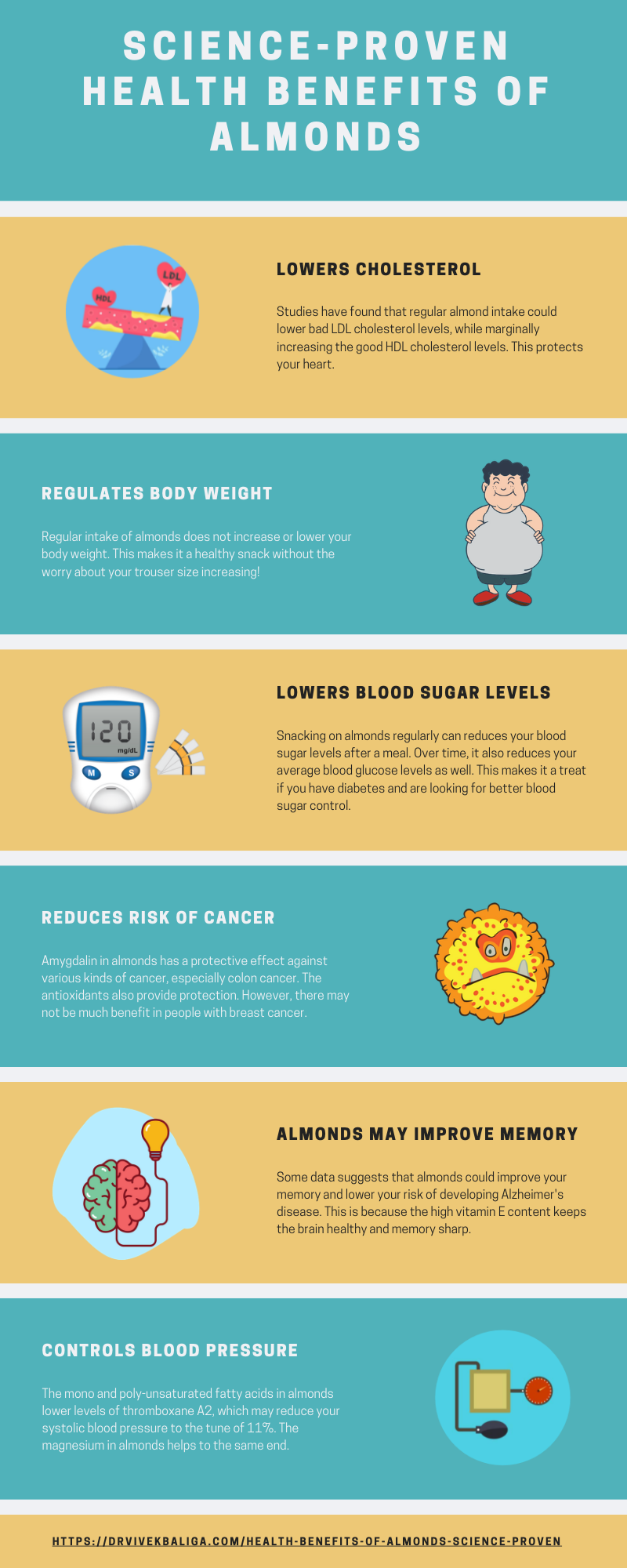
Health Benefits Of Almonds – Why You Should Eat Them Every Day
Almonds are one of my favorite foods to snack on. Their crunch, taste and texture is something I enjoy tremendously.
Time and again, patients ask me whether a handful of almonds are good for health. Some prefer to have a mix of dry fruits, but I often ask them to shift over to almonds.
Today, I will talk about some amazing health benefits of almonds. As always, I keep my word on presenting any benefits listed here with the backing of clinical studies.
What Are Almonds?
The almond is the edible nut of the almond trees, also called Prunus dulcis in the world of biology. Around 80% of the world’s supply of almonds hails from California.

There are two types of almonds – sweet (Prunus dulcis variety dulcis) and bitter (Prunus dulcis variety amara). Sweet almonds are the ones we consume and are used to make almond oil, while bitter almonds are used to make flavoring agents.
Almonds can be consumed either roasted, raw, soaked overnight, and blanched. Almond paste and powder are used commonly in desserts.
Almonds are a nutrient-dense food. I personally believe that a handful of almonds can keep you healthy and your immunity in top shape.
Let’s take a look at why almonds are great for your health.
Nutritional Content Of Almonds
It is hard to imagine that something so small as an almond can be packed with so much power and nourishment.
If you are feeling low in energy, try munching on almonds every day. A 30 gram serving of almonds gives you around 172 kilocalories. This can give you an energy boost when you need it.

Almonds contain good fats
Almonds contain 50% fat in it.
While this may surprise you, given almonds are a ‘health food’, you will be pleased to know that it mostly has good fats in it. Almonds have predominantly mono-unsaturated fatty acids (MUFA), with very low saturated (bad) fats (3.7 gram per 100 grams). In fact, it has the lowest concentration of saturated fats among all the nuts.
Around 62% of the fats present in almonds are mono-unsaturated fatty acids, while 24% are poly-unsaturated fatty acids (PUFA – also a good fat).
These good fats have been shown to lower the risk of cardiac disease and protect the heart. They also lower total cholesterol levels.
Almonds are high in protein
A 30 gram serving of almonds contains around 6.5 grams of protein in it, making it an excellent protein source. In particular, almonds are rich in arginine – an amino acid that is important in a number of biological processes, essential for collagen synthesis and wound healing, and also to boost immunity.
Almonds contain high natural fiber
Almonds contain a good amount of fiber in them. A 30-gram portion has around 3.7 grams of dietary fiber in it.
Dietary fiber plays an important role in keeping your heart healthy and your bowels functioning normally. It has the property of regulating blood sugars as well.
The high fiber in almonds makes it a good snack as well. It keeps you fuller for longer and will keep you from snacking on junk foods now and again.
If you are ever hungry in between meals, munch on a handful of nuts.
Almonds are rich in phytosterols
Almonds do not contain any cholesterol. However, they do contain a compound closely related to cholesterol called phytosterols.
Phytosterols have the property of lowering the absorption of cholesterol from the gut. Over a period of time, it can aid in the reduction of your blood cholesterol levels.
Almonds are loaded with vitamins and minerals
One vitamin that almonds contain a good quantity of is vitamin E. Vitamin E has powerful antioxidant properties that can fight diseases such as cancer.
Other vitamins include b-complex and folic acid. It does not contain vitamin A.
Numerous minerals such as calcium, iron, phosphorus, zinc, copper, potassium and magnesium are present in naturally high quantities in almonds. They are low in sodium but high in potassium.
It is all these nutritional elements that make almonds one of the healthiest foods on the planet.
Health Benefits Of Almonds
When we look at how any food can impact one’s health, we look at the vital organs.
How do almonds protect the heart?
Do almonds reduce cholesterol levels?
Can almonds protect my memory?
Almonds Improve Heart Health
The health of our heart is dependent on numerous factors – exercise, diet, cholesterol levels, blood pressure, blood sugar and any vices we may have (smoking, alcohol intake, etc)
So when we evaluate the true benefits of any foods on heart health, we look at whether any of these parameters can be altered for the better.
Lowers Cholesterol
Let’s take a look at cholesterol, for example. The INTERHEART study, a robust clinical study looking at heart disease, clearly showed that high cholesterol levels can have a negative impact on heart health. In particular, high levels of LDL cholesterol, or bad cholesterol was associated with worse heart disease.
The high concentration of MUFA and PUFA in almonds make it a great food if you are looking to lower your cholesterol.
Studies have found that consuming 45 grams of almonds a day reduced the bad cholesterol levels significantly. Total cholesterol levels dropped by around 8 points (8mg/dL), while LDL reduced by around 5 points (5mg/dL).
Similarly, another study conducted in Pakistan found that almond consumption increased good cholesterol i.e. HDL levels in patients with coronary artery disease. Data has shown that every 10 point increase in HDL cholesterol halves your risk of heart disease.
Almonds are high in alpha-tocopherol, a compound closely related to vitamin E. It is believed to bear the cholesterol-lowering properties of almonds.
Controls Body Weight
Obesity is strongly linked to heart disease and a multitude of health issues. Excessive intake of snacks and junk food is a primary cause, along with the lack of exercise.
Almonds contain a significant amount of fat. So naturally, having a snack that is high in fat could increase body weight.

Fortunately, there are clinical studies that have shown that eating almonds as a snack over long periods of time does not have much bearing on body weight. In other words, it is unlikely to increase your weight.
This is because the absorption of energy from almonds is inefficient in the human body. Furthermore, they have a high satiety value, so it is unlikely you would snack too much on them.
When almonds are consumed as a part of a low-calorie diet, there seems to be a greater degree of weight loss.
It appears from available data that almonds are weight neutral. The weight loss that is seen would only be evident if a low-calorie diet were followed. However, snacking on almonds will not increase your weight.
This is probably because almonds have a high fiber content, which helps control body weight. Also, some of the fats in almonds are not absorbed well in the digestive tract and are expelled out in feces.
Overall, this would translate into almonds being healthy for your heart.
Almonds And Diabetes
I have diabetes – can I eat almonds?
Yes, you can!!
Almond consumption at the time of a meal has been shown to lower HbA1c levels and postprandial glucose levels. However, the effects on fasting glucose values are limited. Data is conflicting though, with other studies showing a beneficial effect on fasting glucose as well.

At the core of diabetes is a phenomenon called insulin resistance. Here, the cells in the body do not respond to the insulin that is secreted by the pancreas to help transport glucose from the blood into the cells and tissues.
Insulin resistance is the first phenomenon that eventually leads to not just diabetes, but also heart disease.
One way of assessing the presence of insulin resistance is measuring a parameter called homeostasis model assessment of insulin resistance index, or HOMA-IR index. A higher index indicates a higher chance of developing diabetes. Generally, South Asian populations have a higher HOMA-IR index compared to Caucasians.
Almonds have been found to lower the HOMA-IR index, which means they lower your chance of developing diabetes in the future.
A link has been found between low magnesium levels and diabetes in adults. Replacing magnesium appears to help bring blood sugar levels under control effectively. Almonds are a good source of magnesium, so they may be able to restore some normalcy to blood glucose levels in diabetes.
Almonds And Blood Pressure
An Indian study looking at almond intake over 24 weeks did not find any change in blood pressure values in the test subjects. . On the other hand, another study looking at intake on 84 grams of almonds every day over a 24 week period, combined with a low-calorie diet found an 11% reduction in the systolic blood pressure.
However, other studies have found that it might lower systolic blood pressure, but not diastolic blood pressure values.
There are some mechanisms through which almonds may lower your blood pressure. For example, the MUFA and PUFA I mentioned earlier have the property of lowering levels of a compound called thromboxane A2. Thromboxane A2 can constrict the blood vessels and hence increases BP. By lowering the levels, blood pressure could come down.
Similarly, the minerals in almonds could potentially lower blood pressure. Magnesium can stimulate the production of nitric oxide and prostacyclins. These are compounds that enlarge the blood vessels, lowering the pressure within them. This lowers blood pressure.
The potassium in almonds alters a hormone pathway in the kidney called the renin-angiotensin system, lowering blood pressure. Calcium can block the actions of a hormone called parathormone – a hormone secreted by the parathyroid gland, a small gland near your thyroid gland in the neck.
These are just possible mechanisms. There does not appear to be a strong link between eating almonds and lowering your blood pressure.
Almonds Lower Cancer Risk
Lab-based studies looking at anticancer effects of almonds have shown some effect in preventing oral cancer cells from growing. This is believed to be due to a compound called amygdalin in almonds (it is also found in apples, peaches, and blackberries).

Amygdalin is also effective in preventing the growth of cancer cells in prostate cancer, liver cancer, bladder cancer, and colon cancer, among a few others.
Rat studies have demonstrated that almonds may reduce the chances of cell growth in colon cancer. In another study looking at the intake of almonds, peanuts, and pine nuts, there was a significant lowering of the risk of developing colon cancer in both men and women. Some studies have even claimed the reduction to be to the tune of 24%.
There does not appear to be any benefit of eating almonds to prevent breast cancer. In fact, there might be some harm (I have discussed this later)
But how can almonds lower the risk of cancer?
Almonds are rich in multiple healthy elements – fiber, flavonoids, polyphenols, folic acid, and resveretrol, which are all powerful antioxidants. These compounds can reduce damage to DNA inside the cells, control how cells divide, and lower inflammation (all of these, when out of control, lead to cancer).
Almonds May Improve Your Memory
Memory loss is something many of us dread as we get older. Almonds are a natural solution to improving memory. Regular intake may also prevent Alzheimer’s disease.
When I looked up the clinical studies, I found that most of them were conducted in rodents, with limited studies done in humans.
Vitamin E has been shown to reduce the chances of developing Alzheimer’s disease. Since almonds are a good source of vitamin E, it stands to reason that it would help keep your memory sharp.

Can Eating Too Much Almonds Be Harmful?
You would think that given the health benefits of eating almonds daily, it is unlikely that there will be any side effects.
Unfortunately, too much of a good thing can be bad.
Almonds are rich in copper. Eating too many almonds every day can be harmful in women with breast cancer, as the copper can be harmful.
Those allergic to nuts should avoid almonds completely. If accidentally consumed, it could lead to skin eruptions, itching, swollen lips and tongue, difficulty swallowing, and breathing difficulty. I have even encountered a patient who is deathly allergic to nuts.
For this reason, when buying foods off the shelves in the supermarket, check the label to see if the product contains nuts.
Make sure the almonds you buy are unsalted. Salted almonds can be bad if you have high blood pressure.
Given the fiber content in almonds, excessive consumption can lead to bloating and digestive issues. It could also lead to an unhealthy increase in your vitamin E levels, which can have harmful effects.
To Soak Or Not To Soak
There is no clear data on this. However, the age-old tradition of soaking almonds overnight and eating them the next morning without the skins on appears to be the best way.
Almond skins contain a compound called tannins. These prevent the absorption of the nutrients during digestion. When soaked, the concentration of these tannins comes down. One such compound is d-myo-inositol hexaphosphate, which is significantly reduced, though to the tune of just under 5%.
Soaked almonds have a higher content of vitamin E, which may improve memory. Do note that soaking almonds does not make it easier to digest.
These facts notwithstanding, there is some evidence that the polyphenols in the skin of almonds have antioxidant properties. These polyphenols may have antibacterial properties as well, with the ability to fight numerous bacterial infections.
Personally, I feel you could either have them soaked or roasted. Either way, you will reap the health benefits.
How Much Almonds To Eat Everyday?
Studies have looked at anywhere between 30 to 45 grams of intake daily for benefits. Stick with a handful twice daily – that should be enough. It’s a healthy snack!
Closing Remarks
As a health food, almonds are among the champions. The nutritional content is remarkable. I strongly recommend you munch on some every day.

Dr Vivek Baliga is a medical practitioner and the director of a diagnostic center – Baliga Diagnostics – in Bangalore. He specializes in diabetes and heart disease, and is a visiting consultant in Internal Medicine at corporate hospitals. He is married and has one son.

Excellent article, though I eat almonds regularly I was not aware of the excellent health benefits it has!!!
We did know the benefits of almond. Nevertheless we started to have 5-6 almonds soaked overnight with our breakfast since a couple of months.
We are happy to know the multiple benefits of almond
from your article.
I am a regular reader of your articles. They have helped us in improving quality of
Our life.
Thank you
With regards.
Balakrishna
Thank you for your kind words. Glad you found it useful!
I have been eating Almond last 14 to15yes.I started eating 4
Almond every day as per Baba Ramdev advice.Now I eat 5 to 6 everyday.I am diabetic and blood pressre last 30yes and aged 80yes and active
Glad to hear sir! Thank you for commenting.
Dr. Can patients with high protein issues consume almond, will it affect kidney?
Very high intake has been associated with increase in oxalate levels and stone formation. Otherwise, usually not much to worry about.
very useful read just as other articles of yours have been. I always look forward to receive them. Well researched and educative !
Excellent information for the benefit of all. Knowing fully well the Doctor has very good patience in understanding the patients issues and parts with the required information.
Really a wonderful information about Almands. Actually we ie., myself and my wife regularly take 5 almonds (each)soaked in water for 24 hours daily even without knowing the merits.
Appreciate very much for the intensive work done by the Doctor and expect so many such papers in the near future.
Regards,
C. Durga Prasad